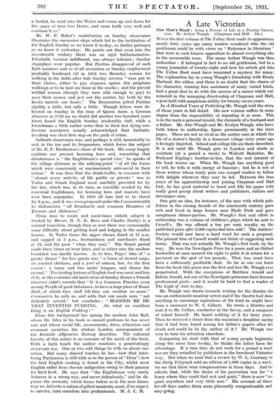A Late Victorian
One Man's Road : being a Picture of Life in a Passing Genera- tion. By Arthur Waugh. (Chapman and Hall. 18s.)
WnEN the first volume of The Yellow Book made its appearance nearly forty years ago many readers wondered who the old gentleman could be with views on " Reticence in literature " that were in such bizarre opposition to almost everything else in the memorable issue. The name Arthur Waugh was then unfamiliar : it belonged in fact to no old gentleman, but to a young journalist of twenty-eight and how his article got into The Yellow Book must have remained a mystery for many. The explanation lay in young Waugh's friendship with Henry Harland, the editor, and there is no doubt that the charm of his character, winning him assistance of many varied kinds, had a great deal to do with the success of a career which cul- minated in the managing directorship of Chapman and Hall, a post held with auspicious ability for twenty-seven years.
In A Hundred Years of Publishing Mr. Waugh told the story of those years in full detail. His new volume suffers in some degree from the impossibility of repeating it so soon. This is in the main a personal record, the chronicle of a husband and a father. Mr. Alec Waugh and Mr. Evelyn Waugh, who have both taken to authorship, figure prominently in the later pages. These are not so vivid as the earlier ones in which the life of a doctor's family in a Somerset village sixty years ago is lovingly depicted. School and college life are there described. It is not until Mr. Waugh gets to London and starts as assistant (at a pound a week) to Wolcott Balestier, Mr. Rudyard Kipling's brother-in-law, that the real interest of the book warms up. When Mr. Waugh has anything good to tell, he tells it with energy of humour ; but he is not of those writers whose ready pens can compel readers to follow with delight wherever they may be led. Between the lean years of his apprenticeship and joining Chapman and Hall Ltd., he has good material to hand and fills his pages with really good gossip about writers and publishers, editors and newspaper men.
One gets an idea, for instance, of the ease with which pub- lishers in the closing decade of the nineteenth century grew rich and lived in large houses near Hyde Park and gave sumptuous dinner-parties. Mr. Waugh's first real effort in authorship was a volume of children's plays which he sent to Cassell's. He was offered a ten per cent. royalty on the published price after 2,000 copies had been sold ! The Authors' Society would now have a hard word for such a proposal. The present firm of Cassell would not think of suggesting such terms. That was not actually Mr. Waugh's first book, by the way. He won the Newdigate Prize for a poem and an Oxford bookseller at once secured the right to print it in return for a payment on the spot of ten pounds. That, too, must have been a sufficiently profitable deaL So far as one can learn from the book this poem was the first and last Mr. Waugh ever perpetrated. With the exceptions of Matthew Arnold and Edwin Arnold, not one of the Newdigate prizemen have become professional poets—and it would be hard to find a reader of The Light of Asia to-day.
Mr. Waugh was drawn towards writing for the theatre (he was an enthusiastic amateur actor) and if the theatre had done anything to encourage aspirations of the kind he might have been a successor to W. S. Gilbert. He wrote a libretto and sent it to Mr. Cellier, conductor at the Savoy, and a composer of talent himself. He heard nothing of it for forty years. Then he received a letter from the musician's daughter saying that it had been found among her father's papers after his death and could he be the author of it ? Mr. Waugh was wise to turn his attention elsewhere.
Comparing his start with that of young people beginning along the same lines to-day, he thinks the latter have the advantage. It is true they do not work for a pound a week
nor are they swindled by publishers in the barefaced Victorian way. But when we read that a review by W. L. Courtney in the Daily Telegraph sold an edition of 1,000 copies in a week,
we see that there were compensations in those days. And he
admits that, while the desire of his generation was for " a home where they could find rest and quiet," there is now "no
quiet anywhere and very little rest." His account of those far-off days makes them seem pleasantly companionable and easy-going.


































 Previous page
Previous page